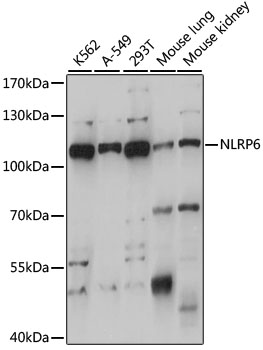-
Product Name
NLRP6 Polyclonal Antibody
- Documents
-
Description
Polyclonal antibody to NLRP6
-
Tested applications
WB, IF
-
Species reactivity
Human, Mouse, Rat
-
Alternative names
NLRP6 antibody; AVR antibody; CLR11.4 antibody; NALP6 antibody; NAVR antibody; NAVR/AVR antibody; PAN3 antibody; PYPAF5 antibody; NLR family pyrin domain containing 6 antibody
-
Isotype
Rabbit IgG
-
Preparation
Antigen: A synthetic peptide corresponding to a sequence within amino acids 100-200 of human NLRP6 (NP_001263629.1).
-
Clonality
Polyclonal
-
Formulation
PBS with 0.02% sodium azide, 50% glycerol, pH7.3.
-
Storage instructions
Store at -20℃. Avoid freeze / thaw cycles.
-
Applications
WB 1:500 - 1:2000
-
Validations

Western blot - NLRP6 Polyclonal Antibody
Western blot analysis of extracts of various cell lines, using NLRP6 antibody at 1:1000 dilution.Secondary antibody: HRP Goat Anti-Rabbit IgG (H+L) at 1:10000 dilution.Lysates/proteins: 25ug per lane.Blocking buffer: 3% nonfat dry milk in TBST.Detection: ECL Basic Kit .Exposure time: 30s.
-
Background
As the sensor component of the NLRP6 inflammasome, plays a crucial role in innate immunity and inflammation. In response to pathogens and other damage-associated signals, initiates the formation of the inflammasome polymeric complex, made of NLRP6, PYCARD and CASP1 (and possibly CASP4 and CASP5). Recruitment of proCASP1 to the inflammasome promotes its activation and CASP1-catalyzed IL1B and IL18 maturation and secretion in the extracellular milieu. The precise NLRP6 activation stimulus has not been identified yet (By similarity). Essential for gut mucosal self-renewal and proliferation. Maintains intestinal homeostasis and a healthy intestinal microbiota. This function is, at least partially, mediated by IL18, and not IL1B, produced by nonhematopoietic cells. Influences intestinal barrier function and microbial homeostasis through the regulation of goblet cell mucus secretion. Acts by promoting autophagy in goblet cells, an essential step for mucus granule exocytosis. Its role in goblet cell physiology is inflammasome-dependent, but IL1B- and IL18-independent. During systemic bacterial infections, may negatively regulate inflammatory signaling and inhibit the influx of monocytes and neutrophils to the circulation and to the peritoneum. May promote peripheral nerve recovery following injury via an inflammasome-independent mechanism (By similarity).
Related Products / Services
Please note: All products are "FOR RESEARCH USE ONLY AND ARE NOT INTENDED FOR DIAGNOSTIC OR THERAPEUTIC USE"
